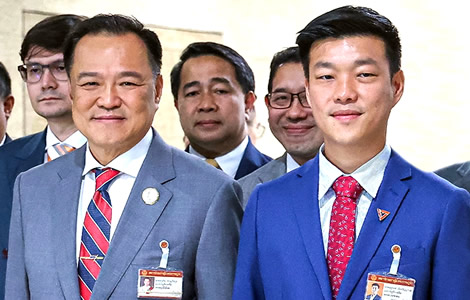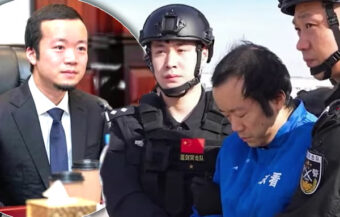Pheu Thai launches a shocking court challenge seeking to remove Anutin and Natthaphong as MPs, claiming the interim government MOU violates Thailand’s rigid 2017 Constitution and illegally trades political favours, sparking a major political and legal confrontation.
Just as the Pheu Thai Party looked set to regain political momentum, it has taken a sharp detour—launching a high-stakes legal challenge against the Memorandum of Understanding (MOU) between the People’s Party and Bhumjaithai, which underpins the current interim government. Filed with the Speaker of the House last Friday, the petition—based on fresh legal advice—demands the removal of Prime Minister Anutin Charnvirakul and People’s Party leader Nattapong Ruangpanyawut or ‘Teng’ from Parliament. What comes next is unclear. Certainly, the Constitutional Court may toss the case without even a hearing.

At the heart of the challenge is the claim that the MOU amounts to illegal political horse-trading—one party influencing the other in return for favours. In most Western democracies, that’s politics as usual. But Thailand is still boxed in by the rigid, military-drafted 2017 Constitution and its suffocating laws, like the Political Parties Act. Under these rules, backroom deals aren’t just frowned upon—they can be illegal.
A Constitutional Court case has been launched by Pheu Thai Party MPs in the House of Representatives. They argue that the Memorandum of Understanding signed by the People’s Party and Bhumjaithai Party last Friday breached key constitutional provisions. Specifically, the MPs claim that the agreement, which secured the election of Anutin Charnvirakul as Prime Minister, constitutes illegal influence under the 2017 Constitution. Moreover, the complaint contends that the deal undermines the principle of majority rule and threatens the stability of parliamentary governance.
Memorandum seen to permit minority rule, triggering Pheu Thai petition to the Constitutional Court
Although similar political agreements are common in Western democracies, where parties exchange support to achieve mutual goals, Thailand’s context differs. The 2017 Constitution is highly inflexible, making such arrangements potentially unconstitutional.
In addition, Pheu Thai MPs stress that the Memorandum effectively allows the formation of a minority government without a majority in the House of Representatives. Consequently, they argue that this violates both democratic norms and Thailand’s rigid constitutional requirements.
The constitutional advice appears to have been delivered to Pheu Thai Party leaders on Friday morning, just hours before the House vote. This advice reportedly influenced the party’s prior offer to call a General Election immediately if their nominee had been elected Prime Minister.
Nonetheless, party sources admit that they initially agreed to terms set by the People’s Party at the outset of last week’s political crisis. Furthermore, senior party leaders claim they were unaware at the time of the legal implications highlighted by constitutional advisors.
On Sunday, media reports confirmed that over 50 MPs had signed a petition seeking Constitutional Court intervention. The petition was first submitted to Speaker Wan Muhamad Noor Matha, and it requests a ruling on the potential dismissal of Anutin Charnvirakul and Natthaphong Ruangpanyawut from the House of Representatives.
Petition links agreement to referendum, dissolution plan and potential new Constitution for Thailand
According to petitioners, the agreement was to dissolve Parliament within four months and linked this with a possible referendum on constitutional amendments. Consequently, they argue that the Memorandum represents undue influence and interference in parliamentary duties.
The petition states that no less than one in ten MPs endorsed the submission, exceeding the threshold required to seek the Constitutional Court’s review.
The petition was officially stamped by the Office of the Secretary of the House of Representatives on September 5, 2025, at 11:38 a.m., under receipt number 14239/2025. The MPs seek the termination of Anutin and Natthaphong’s memberships under Section 101 (2) in conjunction with Section 185 (1) and (2) of the Constitution.
This case follows the Constitutional Court ruling on Prime Minister Paethongtarn Shinawatra’s ministerial status. On August 29, 2025, the Court ruled in case no. 17/2568 that her ministerial post must end individually under Sections 170 (4) and 160 (5) of the Constitution. Subsequently, the Cabinet resolved that Deputy Prime Minister Phumtham Wechayachai would act in place of the Prime Minister.
Therefore, when the Prime Minister leaves office, the House must approve a successor according to Section 154 of the Constitution. Additionally, Section 159 requires that a Prime Ministerial candidate secure votes from over half of all MPs.
People’s Party votes said to come with conditions favouring constitutional overhaul and early election
The petition asserts that the Bhumjaithai Party secured only 146 MPs from allied parties, far short of the required 246 votes in the 492-member House.
Therefore, the party reportedly entered an agreement with the People’s Party. Under this arrangement, People’s Party MPs would vote for Anutin as Prime Minister, even while refusing to join the government. The agreement included strict conditions to ensure the new Prime Minister would act according to their plan.
The first condition required the Prime Minister to dissolve the House within four months and hold a general election. Second, if the Constitutional Court ruled a referendum necessary before amending the 2017 Constitution, the Cabinet would conduct the referendum and create a new constitution through an elected Constitutional Drafting Assembly.
Third, if no referendum were required, the parties would expedite the amendment process through the assembly during the current parliamentary term.
Fourth, the Bhumjaithai Party would not attempt to form a majority government, ensuring the dissolution plan could not be circumvented. Fifth, the People’s Party would remain in opposition and hold no ministerial positions.
Petition argues MOU violates the Constitution and Political Parties Act by allowing party interference
Petitioners argue that this agreement violates Section 114 of the Constitution, which requires MPs to act independently, honestly and in the nation’s best interest. They claim that the Memorandum imposes the mandate of one party over coalition MPs, undermining their independence.
Furthermore, Section 164 obliges the Cabinet to act with transparency, prudence, and dedication. Yet, the agreement’s conditions, including a forced dissolution and minority government limitations, contradict these principles. Consequently, the MPs argue, the arrangement undermines democratic governance and administrative efficiency.
The petition also cites violations of the 2017 Organic Act on Political Parties. Section 46 prohibits the exchange of benefits between parties to influence governmental appointments.
The MPs argue that the Memorandum constitutes precisely such an exchange, where both Bhumjaithai and People’s Party interests supersede national interests. In addition, Sections 28 and 29 of the Political Parties Act prevent one party from controlling another’s actions, which petitioners claim occurred. Therefore, they assert, the parties acted contrary to both constitutional law and political party regulations.
Petition claims the MOU allows unconstitutional gain of power contrary to Section 42 of the charter
Petitioners emphasise that the arrangement is hostile to democratic governance under the King as Head of State. They argue that it allows individuals to acquire government power through unconstitutional methods, contrary to Section 42.
Specifically, the petition identifies Anutin Charnvirakul and Natthaphong Ruangpanyawut as responsible for arranging and enforcing the Memorandum. Moreover, the Prachachon Party’s conditions require the Cabinet to implement policies benefiting the party rather than the public, including parliamentary dissolution, elections and constitutional referendums.
As a result, petitioners claim the actions of these leaders violate Section 185 (1) and (2). These govern the conduct and termination of MPs. They request that Anutin and Natthaphong be dismissed from the House under Section 101 (7). The petition also stresses the MPs’ right under Section 2 to seek Constitutional Court review. It requests that the Speaker of the House submit the petition promptly for judicial consideration.
Observers note that the case highlights ongoing tension between constitutional rigidity and political expediency. While minority government arrangements are routine in other countries, Thailand’s junta-imposed legal framework is strict.
Legal experts say petition could set precedent as Constitutional Court weighs case’s admissibility
Political analysts warn that these disputes may continue as parties negotiate unusual power-sharing agreements. They also emphasise the importance of transparency and adherence to constitutional norms.
The House of Representatives’ role in forwarding the petition is procedural but crucial. Speaker Wan Muhamad Noor Matha confirmed receipt, signalling that formal processes are being followed. Legal experts note that the case could set an important precedent for evaluating future Memorandums of Understanding. Such rulings may determine the limits of coalition politics and the enforceability of cross-party agreements.
Firstly, it has to be seen whether the court will hear this case. It may, of course, summarily dismiss the proceedings as groundless.
Notably, the petition filed by Pheu Thai Party MPs requests the termination of Anutin Charnvirakul and Natthaphong Ruangpanyawut as MPs.
Petition may face dismissal but brings renewed scrutiny of Thailand’s legal and constitutional rigidity
It alleges violations of multiple constitutional provisions, the Political Parties Act, and principles of democratic governance. The matter is now before the Constitutional Court, but first, judges must decide whether to take up the case. In short, judges must determine whether there is a case to be heard in the matter.
The case can, of course, be seen as the product of an impractical and over-controlling 2017 constitution. In addition to associated laws such as the Political Parties Act 2017. All imposed by the junta government which was in power from 2014 to 2019. Former Prime Minister Thaksin Shinawatra last year described these as ‘shitty laws’ that were, in essence, holding the country back.
Prime Minister Anutin Charnvirakul tells guests at Royal Command ceremony his duty was to the people
The legal case is already drawing fire from People’s Party supporters. Neither is it likely to be popular with the public. Indeed, this approach is similar to Pheu Thai’s failed attempt to dissolve Parliament last Thursday. It may ultimately harm the party’s popularity. This comes at a time when it is ideally placed to benefit from the public’s unhappiness with the interim government.
Join the Thai News forum, follow Thai Examiner on Facebook here
Receive all our stories as they come out on Telegram here
Follow Thai Examiner here
Further reading
Prime Minister Anutin Charnvirakul tells guests at Royal Command ceremony his duty was to the people
Thaksin tells Pheu Thai leaders he will return on Monday to face Tuesday’s Supreme Court hearing


















